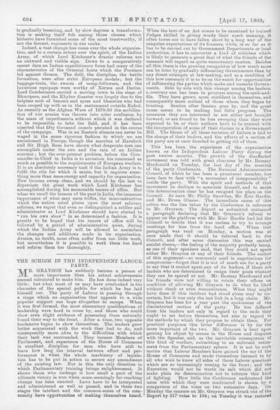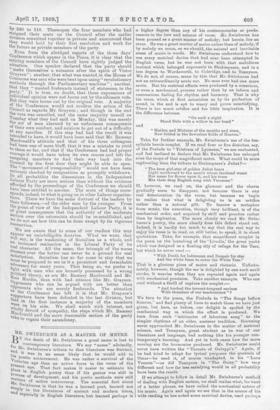THE SCHISM IN THE INDEPENDENT LABOUR PARTY.
MR. GRAYSON has suddenly become a person of more importance than his actual achievements seemed calculated to make him, He has done indeed very little ; but what most of us may have overlooked is the character of the special public for which he has laid himself out. The party of Labour is passing through a stage which no organisation that appeals to a wide popular support can hope altogether to escape. When it was first formed, the most elementary qualifications of leadership were hard to come by, and those who could show even slight evidence of possessing them naturally found their way to the front. After a time, two opposite tendencies began to show themselves. The leaders grew better acquainted with the work they had to do, and consequently more alive to the difficulties with which their task was surrounded. They became Members of Parliament, and experience of the House of Commons is excellent discipline for men who have still to learn how long the interval between effort and per- formance is when the whole machinery of legisla- tion has to be put in action to secure any amendment of the existing law. Nor is this the only direction in which Parliamentary training brings enlightenment. It shows those who undergo it how small a part of the ultimate victory is won when some seemingly far-reaching change has been enacted. Laws have to be interpreted and administered as well as passed, and in these two stages the intellect and the common-sense of the com- munity have opportunities of making themselves heard. When the text of an Act comes to be examined by trained. Judges skilled in giving words their exact meaning, it often turns out to have fallen short by a long way of the sanguine expectations of its framers, while, in so far as it has to be carried out by Government Departments or local authorities, it has to encounter a kind of criticism which is likely to generate a. great deal of what the friends of the measure will regard as quite unnecessary caution. Besides all this, there is the growing recognition of how much more can be done by gradually influencing Governments than by any direct attempts at law-making, and as a condition of this how necessary it is to be on the watch for opportunities of influencing the parties which make and unmake Govern- ments. Side by side with this change among the leaders, a contrary one has been in progress among the rank-and- file. They have grown more confident in themselves, and consequently more critical of those whom they began by trusting. Session after Session goes by, and the great cause seems to be making but little progress. The measures they are interested in are either not brought forward, or are found to be less sweeping than they were expected to be, or their authors have to be content with the incorporation of some of their clauses in a Government Bill. The blame of all these varieties of failure is laid to the charge of their leaders, and the efforts of a section of the party are at once directed to getting rid of them.
This has been the experience of the organisation known as the Independent Labour Party during the past twelve months. The growth of the disaffected movement was told with great clearness by Mr. Ramsay Macdonald on Tuesday, the last day of the meeting of the party Conference. The National Administrative Council, of which he' has been a prominent member, has been face to face with "a movement of irresponsibility" inside the party. With the spirit and methods of that movement he declines to associate himself, and to make this determination clear he has resigned his place on the Council. So have Mr, Philip Snowden, Mr. Keir Hardie, and Mr. Bruce Glasier. The immediate cause of this action was the line taken by the Conference in reference to Mr. Grayson. The Report as submitted contained a paragraph declaring that Mr. Grayson's refusal to appear on the platform with Mr. Keir Hardie had led the Council to decide that it was useless to try to arrange meetings for him from the head office. When this paragraph was read on Monday, a motion was at once made that it should be referred back to the Council, and after some discussion this was carried amidst cheers,—the feeling of the majority probably being, as one of their speakers said, that they could not spare either Mr. Grayson or any of their friends. The author of this argument—so commonly used in negotiations for ,compromise—forgot that it is not of much use for a party to say that it cannot spare any of its leaders, if there are leaders who are determined to resign their posts whether they can be spared or not. Mr. Ramsay Macdonald and his friends were not willing to retain their offices on condition of allowing Mr. Grayson to do what he liked without check or even remonstrance. What they might have done if this incident had stood alone may be un- certain, but it was only the last link in a long chain. Mr. Grayson has been for a year past the spokesman of the discontented section of the party. He has differed from his leaders not only in regard to the ends they ought to set before themselves, but also in regard to the methods by which they propose to obtain them. For practical purposes this latter difference is by far the more important of the two. Mr. Grayson is bent upon gaining his object by scenes in the House and disputes with the Speaker, and, as the inevitable consequence of this kind of warfare, submitting to an enforced retire- ment from the Parliamentary sphere. It is not by such tactics that Labour Members have gained the ear of the House of Commons and made themselves listened to by all who wish to know all sides of those Labour questions which are so increasingly coming to the front ; and the Executive would not be worth its salt which did not make plain its determination not to tolerate this kind of fighting. How little the Conference understood the issue with which they were confronted is shown by a comparison of the votes on two successive days. On Monday the censure on Mr. Grayson was struck out of the Report by 217 votes to 194; on Tuesday it was restored by 240 to 110. Thereupon the four members who had resigned their seats on the Council after the earlier divieion consulted together in private and announced that they would hold by their first resolution and work for the future as private members of the party. Even from the abridged reports of the three days' Conference which appear in the Times, it is clear that the retiring members of the Council have rightly judged the situation. One speaker declared that the party should " make themselves a nuisance after the spirit of Victor Grayson"; another, that what was ws.nted.in the House of Commons was men who were bent upon using" revolutionary methods through the Parliamentary machine " ; another, that they "wanted firebrands instead of statesmen in the party," It is true, no doubt, that these expressions of individual opinion were not borne out by the ultimate vote. But they were borne out by the original vote. A majority of the Conference would not confirm the action of the Council as regards Mr. Grayson ; and though in the end the vote was cancelled, and the same majority unsaid on Tuesday what they had said on Monday, this was merely the act of men alarmed by an unforeseen consequence of their own conduct, and anxious to get out of a difficulty t.tt any sacrifice. If this step had had the result it was 1...ntended to have, it would have been said that Mr. Ramsay olacdonald's attitude and that of his three colleagues had been one of mere bluff, that it was a mistake to yield to them so far, and that if the Conference had had proper courage it would have taken its own course and left the resigning members to find their way back into the Pouncil by the first door they might be able to open. , Ihe "movement of irresponsibility" would not have been eeriously checked by resignations so promptly withdrawn. all probability the dissensions in the Independent L abour Party are more serious than without the evidence ,aflorded by the proceedings of the Conference we should Have been entitled to assume. The state of things corre- !Ponds, indeed, to what is going on in other Labour orgauisa- w on 8. There we have the same distrust of the leaders by their followers,—of the older men by the younger. From the point of view of the Independent Labour Party, it is Of great consequence that the authority of the moderate section over the extremists should be re-established, and we do not see how this can be done except by its vigorous reassertion.
We are aware that to some of our readers this may apPear an unintelligible doctrine. What we want, they 1v111 .say, is the weakening of Socialism as a whole, and an increased realisation in the Liberal Party of its real character. All the same, the triumph of the worse element over the better can never be a ground for real natialaction. Socialism has so far come to stay that we ainst be prepared to see in it a persistent and formidable f!dversary for many years. That being so, we prefer to ngl!t. with num who are honestly possessed by a wrong t?1!ticill theory, as are Mr. Ramsay Macdonald and Mr. ,.,elr Hardie, than with bad citizens like Mr. Grayson. `TPonents who can be argued with are better than °Pponents who are merely firebrands. The situation " the Conference has left it is that Mr. Grayson's ,anPporters have been defeated in the last division, but glat in the first instance a majority of the members ,ere on his side. We shall watch with interest, not devoid of sympathy, the steps which Mr. Ramsay n• icdonald and the more reasonable section of the party ouie to regain their ascendency.







































 Previous page
Previous page